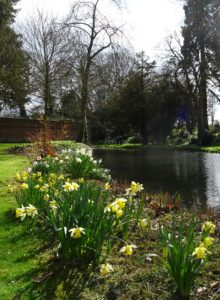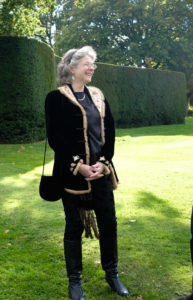Government proposals to speed up the UK planning system are putting England’s green “crown jewels” at risk, according to the charity set up to protect them.
The Ministry of Housing, Communities, and Local Government is launching a consultation on removing a number of statutory consultees from the planning process.
They include the Gardens Trust, founded in 1966 and the only national charity with a statutory responsibility to protect and conserve our heritage of designed landscapes, many of which are on the Register of Parks and Gardens of Special Historic Interest in England.
Sites on the register include urban public parks such as internationally famous Birkenhead Park in Merseyside, globally iconic English gardens such as Chatsworth in Derbyshire or Sissinghurst in Kent, places of remembrance such as Highgate Cemetery in London, institutional landscapes such as the Royal Hospital, Chelsea, – the venue for the RHS Chelsea Flower Show – community hubs such as Stoney Road Allotments, Coventry, and seaside gardens such as the Marine Gardens in Clacton.
The Gardens Trust says that designed landscapes are the crown jewels of our towns and countryside and are at threat from housebuilders, developers and highways construction if Local Planning Authorities no longer have to consult the Trust when considering applications that may affect sites on the Register.
In 2024-25 the Gardens Trust only made 69 critical objections to planning applications on a variety of issues, including schemes that would have seen a total of 1,135 new dwellings built on or affecting the sites it protects.
The cost of the Gardens Trust’s statutory consultee role to the taxpayer is currently £43,963 a year. If it did not carry out this work, the Trust estimates that the cost to Local Planning Authorities to plug the gap would be over £10million if they used additional staff – or more than £30million if they used consultants.
Gardens Trust Chair John Watkins said: “There is no other body able to offer dedicated and expert advice on planning applications that may affect historic parks and gardens, which are the green crown jewels of our towns and countryside.
“Local planning authority resources relating to the historic environment is extremely limited, especially in relation to parks and gardens.
“If they make planning decisions in a vacuum of information about the impact on parks and gardens then the result is likely to be poor quality development and missed opportunities to make the most of the nation’s readymade green infrastructure, which is an irreplaceable resource.
“The impact of removing statutory consultee status from the Gardens Trust is potentially devastating for the conservation and use of parks and gardens nationwide.
“The loss of our input into planning decisions will lead to an increased lack of understanding of key issues by the planning authorities and that lack of understanding will, over time, increase the risk to many valued public parks and treasured designed landscapes throughout the country.
“The Government is rightly focussing on building much needed housing but it needs to also focus on building communities which embrace green spaces, instead of destroying them.”
The Gardens Trust represents and supports 36 local volunteer County Garden Trusts (CGTs) in England and the Welsh Historic Gardens Trust.
It is now encouraging more people to join the Gardens Trust and County Gardens Trusts throughout England and help protect the country’s historic parks and gardens.
Established in 1984 under the National Heritage Act 1983, the Register of Parks and Gardens of Special Historic Interest in England comprises more than 1,700 designed landscapes and includes gardens, public parks, parkland, cemeteries, and other designed landscapes representing our country’s garden history over time.
Along with Historic England, it must be consulted on applications concerning Grade I and II * registered sites but the Gardens Trust is also a statutory consultee for Grade II sites, which make up 65 per cent of the sites on the register.
Visit Britain estimates that in 2022, 11.4 million overseas visitors to the UK included a visit to a garden or park destination as part of their itinerary -30% of the total 38 million overseas visitors.
Deborah Evans, Chair of the Gardens Trust Conservation Committee said: “If the Gardens Trust is no longer consulted on planning applications, then every Registered Park and Garden in the country will be at risk from poor development either within it or close enough to affect people’s enjoyment and understanding.
“Public parks that people enjoy at the end of their road for dog walking, jogging and meeting up with friends could be at risk of being built on by cash-strapped councils. Beautiful historic gardens that we love to visit on special days out could inadvertently make poor decisions about where to put new visitor centres, car parks or even new cafes and paths, resulting in the garden being much less gorgeous than it once was.
“The countryside’s world-famous rural parkland that looks natural but was actually designed hundreds of years ago, could be nibbled away by exclusive housing developments or light industry, replacing a pastoral idyll with urban sprawl. Spectacular views that catch our eyes and take our breath away could be accidentally filled with a wind turbine or warehouse that would be much better in a different location.
“The Garden Trust does not object to all development within Registered Historic Parks and Gardens. We work with applicants, owners and the local planning authority to get the best result for the site going forward. While Historic England may continue to advise, their advice is unlikely to extend to all Registered Parks and Gardens and it cannot benefit from our grass roots knowledge and support.”
John Watkins added: “Historic parks and gardens contribute to our national identity and culture, are places for recreation, relaxation, health and wellbeing and enrich the texture and pattern of our landscapes and townscapes.
“They are a unique record of social, cultural and economic change, provide the setting of homes, businesses and institutions, offer rich and varied habitats for nature conservation and recovery, can hold important stocks of rare or champion trees, shrubs and plant material and are a superb educational resource for understanding our heritage and the cycles of nature.”
For further information on the Gardens Trust and information on how to join its campaign to conserve and protect England’s Registered Parks and Gardens go to www.thegardenstrust.org
ENDS
Issued on behalf of the Gardens Trust




